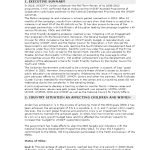Prime Minister
The annual report provides an overview to the country situation in regards to children and women and summary of the humanitarian and developmental assistance of the UNICEF Jordan Country Office (JCO) in 2010. The report includes Jordan’s progress in achieving the Millennium Development Goals in addition to the analysis of the organization’s projects. The projects focus on assisting Iraqi children in education and strengthening young child survival and development and adolescents’ participation and empowerment. The analysis of the report is based on the progress and assessment of the JCO’s projects in partnership with other UN agencies;; local agencies and government ministries. Some highlights of the 2010 annual report include the Ma’An campaign to end violence in school;; the UNICEF’s partnership with the government in supporting Iraqi children in gaining access to public education and a joint programme to develop a tracking system to monitor family violence and abuse cases with other UN agencies and Jordan’s National Council for Family Affairs.
Since Jordan signed a peace treaty with Israel in 1994;; there has been growing tension between the Jordanian government and the independent press;; particularly the kingdom's small-circulation weekly newspapers. Journalists and editors have been arrested;; detained and prosecuted for violations of both the penal code and provisions of the press and publications law of 1993. By the count of one Jordanian weekly newspaper;; since the law went into effect sixty-two cases have been brought against journalists and editors;; the overwhelming majority of them with weekly newspapers. Faced with public opposition to normalization of relations with Israel;; frustration about the implementation of the Oslo Accords between Israel and the Palestinian Authority;; and popular discontent with the state of the economy and high rates of unemployment and underemployment;; Jordanian authorities have clearly signaled a growing discomfort with the exercise of freedom of expression by both individual critics and the press.
This study sheds light on the status of legislative drafting in the Jordanian legal system. It explores both the parties entrusted with the drafting of legislation as well as the entities that aid the drafting. In addition;; the paper looks into legal problems that arise during implementation and the effects on the quality of the legislative product. The study adoptes a descriptive approach to identify and answer the research questions.


